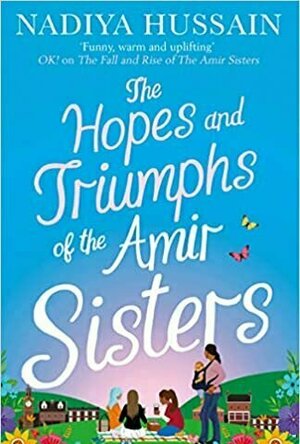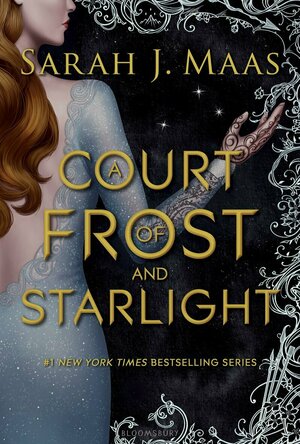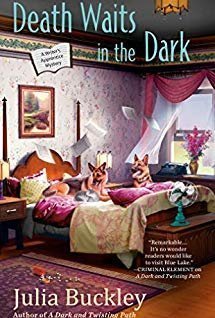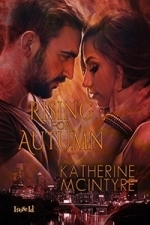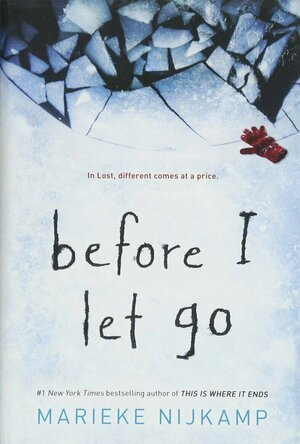Search
Search results
Ivana A. | Diary of Difference (1171 KP) rated The Hopes and Triumphs of the Amir Sisters in Books
Oct 5, 2020
The Hopes and Triumphs of the Amir Sisters by Nadiya Hussain was on my TBR, but I didn’t have the paperback version of the book yet. When I noticed there is an audiobook available from my library, I decided to go ahead and listen to it while I was solving my jigsaw puzzle.
The Hopes and Triumphs of the Amir Sister is the third book in a series that features the Amir sisters. In this book the spotlight is on Mae, the youngest sister of them all. I haven’t read the other two books, but I hope they are better than this one.
Mae was a very annoying character.
And the fact that she was the main character in this book was probably the main reason I didn’t enjoy listening to this book. She has grown up watching her sisters be in the spotlight, living their lives, getting married, having children. She has always been there to help them with everything they might need, because that is her responsibility as their sister.
When Mae heads to university, she fails to fit into any group and make friends. Whenever she goes home and tries to talk about her university life, her stories are lost to the more important stories of her sisters and their babies. Mae feels angry and upset, which leads to her making some decisions that are perhaps unlike her, and also hide some important news from the whole family.
I think the whole family had many issues as a whole, and each individual member had problems on their own.
It is possible that I have never read about a more dysfunctional family that doesn’t work together, but pretends it does. I have seen families that just accept the fact that something is wrong. But this family just keeps going in this weird direction, and it made me uncomfortable throughout the whole journey.
The book in itself handles a lot of sensitive topics, such as sexual advances, public shaming on social media when women put makeup on the train, racism, sexuality, religion, cultural beliefs etc. I felt that this was the only bright spot in the book, to make the readers aware of what is happening, and how some characters respond to it.
Mae was the character I couldn’t relate to the most. Her thoughts and opinions, her way of seeing life was just something I did not agree with. I can understand that she might have been living in a bubble her whole life before moving to university. However, to be so unaware of the outside world and the people around it was just beyond me. I couldn’t agree with how she accepted defeat as something that comes to her by default, and how she was so uninterested to do anything that can make her happier. Refusing to improve in any way is a big character flaw, and I cannot agree with it.
Honestly, I did not enjoy The Hopes and Triumphs of the Amir Sisters.
I am not sure why, but there was so much unnecessary drama, without any real reasoning behind it. Perhaps the fact that I consumed this book as an audiobook has something to do with it as well. The narrator’s voice was really annoying and high-pitched.
The ending was average and very predictable. I didn’t feel as if the characters actually learnt anything in particular about themselves or each other. In conclusion, this book was not for me and I didn’t enjoy it.
The Hopes and Triumphs of the Amir Sister is the third book in a series that features the Amir sisters. In this book the spotlight is on Mae, the youngest sister of them all. I haven’t read the other two books, but I hope they are better than this one.
Mae was a very annoying character.
And the fact that she was the main character in this book was probably the main reason I didn’t enjoy listening to this book. She has grown up watching her sisters be in the spotlight, living their lives, getting married, having children. She has always been there to help them with everything they might need, because that is her responsibility as their sister.
When Mae heads to university, she fails to fit into any group and make friends. Whenever she goes home and tries to talk about her university life, her stories are lost to the more important stories of her sisters and their babies. Mae feels angry and upset, which leads to her making some decisions that are perhaps unlike her, and also hide some important news from the whole family.
I think the whole family had many issues as a whole, and each individual member had problems on their own.
It is possible that I have never read about a more dysfunctional family that doesn’t work together, but pretends it does. I have seen families that just accept the fact that something is wrong. But this family just keeps going in this weird direction, and it made me uncomfortable throughout the whole journey.
The book in itself handles a lot of sensitive topics, such as sexual advances, public shaming on social media when women put makeup on the train, racism, sexuality, religion, cultural beliefs etc. I felt that this was the only bright spot in the book, to make the readers aware of what is happening, and how some characters respond to it.
Mae was the character I couldn’t relate to the most. Her thoughts and opinions, her way of seeing life was just something I did not agree with. I can understand that she might have been living in a bubble her whole life before moving to university. However, to be so unaware of the outside world and the people around it was just beyond me. I couldn’t agree with how she accepted defeat as something that comes to her by default, and how she was so uninterested to do anything that can make her happier. Refusing to improve in any way is a big character flaw, and I cannot agree with it.
Honestly, I did not enjoy The Hopes and Triumphs of the Amir Sisters.
I am not sure why, but there was so much unnecessary drama, without any real reasoning behind it. Perhaps the fact that I consumed this book as an audiobook has something to do with it as well. The narrator’s voice was really annoying and high-pitched.
The ending was average and very predictable. I didn’t feel as if the characters actually learnt anything in particular about themselves or each other. In conclusion, this book was not for me and I didn’t enjoy it.
Ivana A. | Diary of Difference (1171 KP) rated Eleven Lines to Somewhere in Books
Oct 2, 2020
I am extremely happy and excited to be part of the blog tour for Eleven Lines to Somewhere by Alyson Rudd. Thank you to the team at HQ - for sending me a copy in exchange for an honest review. Check out the other book bloggers that are part of the tour as well:
Synopsis:
Everyone is searching for love. Sometimes we just take our own route to find it.
Ryan sees a young woman on the tube on his way to work, and he can't stop looking at her. Attracted and intrigued, he's set to find out more about this mysterious passenger that shares the tube with him.
Sylvie keeps travelling the underground, unable to leave for reasons unknown to Ryan. He hasn't been dating for ten years, when he was at university and the love of his life died.
But for some reason, he feels he needs to help Sylvie. In a world of missed opportunities and what-ifs, a connection has been made.
My Thoughts:
This is the second book I have read by Alyson Rudd, with the first one being The First Time Lauren Pailing Died. That book intrigued me, and when I saw Eleven Lines to Somewhere being published - I had to know and compare them.
At the beginning, I was intrigued, knowing what the synopsis is. We meet Ryan and Sylvie (separately), and we get a small glimpse into their lives. In the beginning, Ryan's story with his family and friends is more talked about. I liked getting to know Ryan, very slowly throughout the first half of the book. He is a very intriguing character himself, going through a personal time, as well as making very controversial decisions to get to know Sylvie better.
I liked Sylvie's story and her connection to the underground. It was very intriguing to me to read and understand how some moments in life can let us become something that we can't help but be. That a certain experience can cause such a need for Sylvie to action. I loved the psychological aspect of her characterisation, and how the trauma was handled.
Once Ryan and Sylvie got to know each other, the pace of the book changed, I felt. The pace was very slow, but the scenes moved very quickly in time.
Even though I loved Ryan and Sylvie as separate characters, I couldn't love them as a couple.
I felt that there was chemistry and romance missing, and somehow their connection to each other was based on the need to help the other one with their own trauma. For me, that being a single reason to love someone makes me think a person is in such a relationship to only feel better about themselves. Look - I helped someone, I am a better person now. But that's just my humble opinion.
There were a lot of side characters that had their own storylines - which I really enjoyed. A lot of drama and twists happened with them, which was quite enjoyable to read. Some characters in the end were thrown into the story abruptly, almost as if for convenience to the story line. But it worked well in the end.
I really enjoyed this story. Still a 4 star, but I enjoyed it more than The First Time Lauren Pailing Died. If you love contemporary books with a lot of characters, this will be a very good pick for you!
Synopsis:
Everyone is searching for love. Sometimes we just take our own route to find it.
Ryan sees a young woman on the tube on his way to work, and he can't stop looking at her. Attracted and intrigued, he's set to find out more about this mysterious passenger that shares the tube with him.
Sylvie keeps travelling the underground, unable to leave for reasons unknown to Ryan. He hasn't been dating for ten years, when he was at university and the love of his life died.
But for some reason, he feels he needs to help Sylvie. In a world of missed opportunities and what-ifs, a connection has been made.
My Thoughts:
This is the second book I have read by Alyson Rudd, with the first one being The First Time Lauren Pailing Died. That book intrigued me, and when I saw Eleven Lines to Somewhere being published - I had to know and compare them.
At the beginning, I was intrigued, knowing what the synopsis is. We meet Ryan and Sylvie (separately), and we get a small glimpse into their lives. In the beginning, Ryan's story with his family and friends is more talked about. I liked getting to know Ryan, very slowly throughout the first half of the book. He is a very intriguing character himself, going through a personal time, as well as making very controversial decisions to get to know Sylvie better.
I liked Sylvie's story and her connection to the underground. It was very intriguing to me to read and understand how some moments in life can let us become something that we can't help but be. That a certain experience can cause such a need for Sylvie to action. I loved the psychological aspect of her characterisation, and how the trauma was handled.
Once Ryan and Sylvie got to know each other, the pace of the book changed, I felt. The pace was very slow, but the scenes moved very quickly in time.
Even though I loved Ryan and Sylvie as separate characters, I couldn't love them as a couple.
I felt that there was chemistry and romance missing, and somehow their connection to each other was based on the need to help the other one with their own trauma. For me, that being a single reason to love someone makes me think a person is in such a relationship to only feel better about themselves. Look - I helped someone, I am a better person now. But that's just my humble opinion.
There were a lot of side characters that had their own storylines - which I really enjoyed. A lot of drama and twists happened with them, which was quite enjoyable to read. Some characters in the end were thrown into the story abruptly, almost as if for convenience to the story line. But it worked well in the end.
I really enjoyed this story. Still a 4 star, but I enjoyed it more than The First Time Lauren Pailing Died. If you love contemporary books with a lot of characters, this will be a very good pick for you!
Chrissy Bush (42 KP) rated A Court of Frost and Starlight: Court of Thorns and Roses in Books
Aug 25, 2022
Super shorr (2 more)
No action
Feels like a Christmas special
The war is over but the aftermath is just starting. With everyone needing to heal and Winter Solstice around the corner, everyone is busy rebuilding their cities and trying to get past all the brutality the war wrought on the people. Feyre and her family are trying to help everyone while also trying to overcome her hat they went through. Buying each other gifts and giving each other support is one of the biggest ways Feyre is helping make the world a better place. Feyre even learns that creating has helped her through some tough times and tries to plan to help others with their tough times. Nothing like Winter Solstice to help bring people together and help them move past the awful things they had to endure.
Review
A Court of Frost and Starlight by Sarah J Maas is like a Christmas special in the middle of a television show. There isn’t any dark and cruel things happening. It was a nice reprieve from the story line, showing how much we all need our friends and families after going through such dark and trying times. It is the shortest of the series this far, but it is also the most touching. Not because anyone is declaring their love or doing cute things, but because of the lessons or ideals behind what is going on.
I will say that even though I’m not into what I deem as filler, it was a nice turn of events. Since every book before this was jam packed with action suspense and strategic planning, seeing our main characters do something like supporting one another, trying to heal and find ways to make the world more peaceful, was nice. I really enjoyed Feyre’s parts as each chapter seemed to focus on one character or another. Not because she is my favorite and I loved seeing her grow as a person, but because she is keeping her promise on making the world a better place. In a way they all are in their own ways but Feyre definitely did something she has not only promised to do, but something that will in turn make their world a more beautiful place to live.
There wasn’t a lot of conflict in A Court of Frost and Starlight, but what can one expect in this particular book. Because it was a Christmas Special in a way, it was very docile compared to what it could have been. Romance did seem to be an underlying concept as I would only assume after everything they went through, but to me it left me not really wanting to continue the series. And not just because I don’t have the last book. The reason I say this is because I felt it wrapped up the series.
What I mean by that is that even in the parts that had me wanting more, just to gather information, I was still left feeling content with it at the end. It just felt right to leave it like that. With all this being said, I would rate this novel three out of five stars. It was good but not my cup of tea so to speak. I tend to not care about books without conflict. It seems the world is going to be better just from this book and in my opinion was a great way to end a series.
Review
A Court of Frost and Starlight by Sarah J Maas is like a Christmas special in the middle of a television show. There isn’t any dark and cruel things happening. It was a nice reprieve from the story line, showing how much we all need our friends and families after going through such dark and trying times. It is the shortest of the series this far, but it is also the most touching. Not because anyone is declaring their love or doing cute things, but because of the lessons or ideals behind what is going on.
I will say that even though I’m not into what I deem as filler, it was a nice turn of events. Since every book before this was jam packed with action suspense and strategic planning, seeing our main characters do something like supporting one another, trying to heal and find ways to make the world more peaceful, was nice. I really enjoyed Feyre’s parts as each chapter seemed to focus on one character or another. Not because she is my favorite and I loved seeing her grow as a person, but because she is keeping her promise on making the world a better place. In a way they all are in their own ways but Feyre definitely did something she has not only promised to do, but something that will in turn make their world a more beautiful place to live.
There wasn’t a lot of conflict in A Court of Frost and Starlight, but what can one expect in this particular book. Because it was a Christmas Special in a way, it was very docile compared to what it could have been. Romance did seem to be an underlying concept as I would only assume after everything they went through, but to me it left me not really wanting to continue the series. And not just because I don’t have the last book. The reason I say this is because I felt it wrapped up the series.
What I mean by that is that even in the parts that had me wanting more, just to gather information, I was still left feeling content with it at the end. It just felt right to leave it like that. With all this being said, I would rate this novel three out of five stars. It was good but not my cup of tea so to speak. I tend to not care about books without conflict. It seems the world is going to be better just from this book and in my opinion was a great way to end a series.
Mark @ Carstairs Considers (2494 KP) rated Death Waits in the Dark in Books
Apr 3, 2019
Don’t Wait in the Dark, Start Reading This Book
Summer has come to Blue Lake, Indiana, and with it the heat. Lena London and her mentor, bestselling author Camilla Graham, are trying to finish their latest manuscript, but the heat is making it hard to concentrate. However, a visit from Jane Wyland doesn’t prove to be a welcome distraction. Jane and Camilla were acquainted when Camilla first moved to the United States from England, but the two haven’t spoken in decades. Jane arrives to tell Camilla that she knows the secret the Graham family has been hiding, and Jane is going to share it with the world if Camilla doesn’t step up and acknowledge it first.
The trouble is, Camilla doesn’t know what secret Jane is talking about even when Jane implies that it is something from Camilla’s husband’s past. The next day, Camilla and Lena go to try to get more information from Jane so they can figure out what has the woman so upset. However, when they arrive, they discover that Jane has been murdered. What was this secret from the past, and did it get Jane killed?
As much as I enjoyed the first three books in this series, it was nice to see the plot move away from Lena’s boyfriend and focus on another character. This change also allowed the book to have even more of a gothic feel to it than the first three. While I’m not super familiar with that genre, I was definitely able to recognize elements of it as the book unfolded, and I enjoyed seeing how it was combined seamlessly with elements of a cozy mystery. The result works and we get a story that drew me in each time I picked up the book and made it hard to put down. The usual cast of characters are still here, and it was great to see them. The suspects didn’t get much page time, but they work perfectly for the story as it is told here since the main drive was to figure out what secret from the past upset Jane so much. This is a fun twist on the cozy mystery, and if you are looking for something slightly different, be sure to pick it up.
The trouble is, Camilla doesn’t know what secret Jane is talking about even when Jane implies that it is something from Camilla’s husband’s past. The next day, Camilla and Lena go to try to get more information from Jane so they can figure out what has the woman so upset. However, when they arrive, they discover that Jane has been murdered. What was this secret from the past, and did it get Jane killed?
As much as I enjoyed the first three books in this series, it was nice to see the plot move away from Lena’s boyfriend and focus on another character. This change also allowed the book to have even more of a gothic feel to it than the first three. While I’m not super familiar with that genre, I was definitely able to recognize elements of it as the book unfolded, and I enjoyed seeing how it was combined seamlessly with elements of a cozy mystery. The result works and we get a story that drew me in each time I picked up the book and made it hard to put down. The usual cast of characters are still here, and it was great to see them. The suspects didn’t get much page time, but they work perfectly for the story as it is told here since the main drive was to figure out what secret from the past upset Jane so much. This is a fun twist on the cozy mystery, and if you are looking for something slightly different, be sure to pick it up.

Sesame Street Alphabet Kitchen
Education and Games
App
This is a vocabulary-building app, which will help your child practice early literacy skills by...
Carma (21 KP) rated Crash Landing (Stop The Wedding, #3) in Books
Jun 17, 2019
While I have quite a few Lori Wilde books sitting on my TBR shelf, this one was a freebie of the day for my kindle and I decided to give it a gander. I read it in about a day so it flowed pretty well. Here are my thoughts on Crash Landing by Lori Wilde.
We start the book with a girl staring at a hunky guy, I mean who doesnt like to do that on occasion right?? Sophia Cruz likes very much what Gibb Martin has to offer in the looks department. He is an American, she is Costa Rican and American by birth. He is all business all the time, while she likes to take each day slow and steady. What could they possibly have in common??
Gibb needs a ride to Florida quickly because his best friend is getting married after only knowing his fiancée for a month. He is backing out of partnering with Gibb, because of his new love, on a new money making deal and that cant happen. Sophia is a bush pilot and his only hope to get there in time to stop the wedding. Now if he can only stop lusting after her long enough to get focused on stopping this wedding.
Sophia wouldnt mind a quick roll in the hay with this rich boy but no long lasting relationship, why would he possibly look at her twice? She really needs the money so she goes against her own better advice and agrees to fly him to Florida. A long close cabin ride will certainly not help squelch her desire.
Gibb and Sophia get to know each other on the flight then the unexpected crash landing on a deserted island gets them even closer. Will they find out they have more in common than they both realize?
I liked the flow of this story for the most part. I feel like it started off and a good pace then slowed a little in the middle. Without giving too many spoilers I feel like there was a weird middle part on the island that served no real purpose but I thoroughly enjoyed the part with the monkeys. I am giggling still as I write this review. I liked Lori Wildes way of capturing the culture and interactions so you could really picture it all in your minds eye. Crash Landing captured my attention pretty quickly and kept it all the way through. I would say this was a good way to get my feet wet in Lori Wildes title pool.
We start the book with a girl staring at a hunky guy, I mean who doesnt like to do that on occasion right?? Sophia Cruz likes very much what Gibb Martin has to offer in the looks department. He is an American, she is Costa Rican and American by birth. He is all business all the time, while she likes to take each day slow and steady. What could they possibly have in common??
Gibb needs a ride to Florida quickly because his best friend is getting married after only knowing his fiancée for a month. He is backing out of partnering with Gibb, because of his new love, on a new money making deal and that cant happen. Sophia is a bush pilot and his only hope to get there in time to stop the wedding. Now if he can only stop lusting after her long enough to get focused on stopping this wedding.
Sophia wouldnt mind a quick roll in the hay with this rich boy but no long lasting relationship, why would he possibly look at her twice? She really needs the money so she goes against her own better advice and agrees to fly him to Florida. A long close cabin ride will certainly not help squelch her desire.
Gibb and Sophia get to know each other on the flight then the unexpected crash landing on a deserted island gets them even closer. Will they find out they have more in common than they both realize?
I liked the flow of this story for the most part. I feel like it started off and a good pace then slowed a little in the middle. Without giving too many spoilers I feel like there was a weird middle part on the island that served no real purpose but I thoroughly enjoyed the part with the monkeys. I am giggling still as I write this review. I liked Lori Wildes way of capturing the culture and interactions so you could really picture it all in your minds eye. Crash Landing captured my attention pretty quickly and kept it all the way through. I would say this was a good way to get my feet wet in Lori Wildes title pool.

Microsoft Edge Preview
Communication
App Watch
Microsoft Edge, now available on Android, creates one continuous browsing experience for Windows 10...
communication
Kirk Bage (1775 KP) rated Game Of Thrones in TV
Aug 6, 2020
Look on the bright side, we all said, without really believing it, when lockdown hit in March – time to watch those box sets we’ve been putting off. Well that was, of course, a great idea! For me that box set was possibly the biggest of all: the behemoth that is GOT.
Much like when a new band gets big quickly and you refuse to listen to the hype, I avoided watching the biggest show in the world, even when it was on in the same room as I tried to read a book in the other corner. It wasn’t that I thought I wouldn’t like it, but more that I didn’t believe it could be anywhere near as good as folk were making it out to be, especially as season one looked like only a slight step up on the swords and sandles exploitation-fests that had been going around. I labelled it “Tits and Dragons” and got on with my life for the next 8 years.
March 2020 will go down in history as the biggest spike in streaming TV services the globe will ever see. Literally millions of previously casual watchers, who had been busy having lives and jobs, turned to Netflix, Amazon Prime, Now TV and iPlayer etc, in search of endless hours of easy entertainment they could immerse their bored and twitchy minds inside of. Without internet at home, I had to go a bit more old school and rely on my daughter posting me the DVDs of GOT season by season.
I found season one enjoyable, with caveats, as it seemed to be one massive exposition (and sexposition) workshop. Obviously the main characters were being set up for big storylines down the road. In which sense it reminded me of a soap opera; in how it flitted between characters and relationships, never dwelling on one plot point for more than two minutes. I liked the way the production had set itself up though – the sets and costumes were of a much higher level than was usual for this kind of thing. Then there was those great opening credits, which become impossible not to hum along to as you get more into it.
Sadly, the first big shock moment didn’t shock me, as I’d heard so much about it on social media 9 years ago. But it was still very well done. Bold and brave; to take out a big name that early was a master stroke. By the end of S1E9 I was properly hooked. Although it helped I didn’t have anything else to do!
The next two weeks I had to wait for season two to be posted out, so I embarked on watching all the DVD commentaries too to kill some time in the evenings whilst I waited. This is almost certainly something I wouldn’t have done under normal circumstances and I believe it is what cemented my enjoyment of it as a whole. Listening to the cast and crew reminisce about what a great time they had, and how close they all were, really helped put it into context for me. I was already loving Peter Dinklage and Lena Headey, but their humour and irreverence in the commentaries made it feel like there were pals in the room watching it with me.
By season two and beyond, I was looking at maps, memorizing every minor character’s name, house and motto, and just immersing in it to the point of obsession. As, I guess, millions of people had already done over the years, but now I got what the fuss was all about. It is an addictive show; you have to know what happens next, you simply can’t leave it alone! Whether it is hissing and booing at Joffrey, or loving to hate Cersei, or siding with the bastards and broken things, there is always something engaging going on – and when a character you disliked dies horribly it is so satisfying!
It is a weird mix, however, of moments so horribly signposted, with some dubious acting, and moments of real surprise and emotion delivered with great acting. Many of the characters really grow into their skins as the actors get more familiar and comfortable being them. The writers too get better at putting the right words in their mouths, and learn to minimise the exposition moments. The young ones in particular really grow impressively as it goes on into seasons 3 and 4. Maisie Williams as the slightly sadistic loner Arya Stark especially. I loved how none stereotypical that character was, and have to say her relationship with The Hound was my favourite thing in the whole show.
At the climax of season four, which I believe was the peak of it artistically, the story arc of Dinklage as Tyrion Lannister, aka The Imp, becomes so compellingly good you can’t take your eyes off him. I had already come to the conclusion that his scenes were the best ones, but this went to 11 on the dial. And it gets better thinking back on it too. Which can’t truly be said of where they go with John Snow and Daenarys, who are ostensibly the main draw by this point, as all storylines seem to mirror their journeys on opposite sides of the world; a song of ice and fire, indeed.
Seasons 5 and 6 continued to be great, even though the dramatic peaks were hard to top. What did improve was the big set pieces, as episodes such as Hardhome and Battle of the Bastards upper the bar on huge battles, staged masterfully. There were things happening that I had never seen in a TV show before, both creatively and budget spent. Watching some of the making of documentaries was fascinating in this regard. The props department alone was astonishingly detailed, to Lord of the Rings degrees, properly impressive!
To go into story and scene details here is pointless, and I don’t want to include any more spoilers than I already have, just in case there is anyone else like me, that hasn’t done the whole journey yet. Obviously, there was some controversy in where seasons 7 and especially 8 went with some storylines and characters. I thought it was mostly fine, to be honest, I just went with it. But it did become a little stretched and hurried, as it raced towards its conclusion. It’s hard for me to get a proper impression of how tense and then annoying it would be to wait a long time for a new season and then have it not go where you imagined it would. Not a problem for me, as I blitzed the final 4 seasons in about a week.
As the episode ratings of season 8 on IMDb indicate, folk were not happy. There was an element of anti-climax, to be fair, but what else could it have been, now so many people claim it as their own? The end isn’t perfect, and that may have a lot to do with the fact they stopped following the books, because they hadn’t been written. In all honestly, I didn’t care. It was spectacular and diverting enough to keep my attention, and my investment in the characters not brutally killed off was not teenage enough to take it personally. I do have sympathy for fans that felt their loyalty betrayed, but come on… it’s just a TV show.
Watching the same fictional world for more than 70 actual hours can do things to you brain. In conclusion I would say I loved going there! The good things always outweighed the annoying things, and it is an experience I would recommend to anyone who hasn’t done it. Whatever age you are, it is a must see phenomenon, like The Sopranos – oh wait, I haven’t seen that yet either…
Much like when a new band gets big quickly and you refuse to listen to the hype, I avoided watching the biggest show in the world, even when it was on in the same room as I tried to read a book in the other corner. It wasn’t that I thought I wouldn’t like it, but more that I didn’t believe it could be anywhere near as good as folk were making it out to be, especially as season one looked like only a slight step up on the swords and sandles exploitation-fests that had been going around. I labelled it “Tits and Dragons” and got on with my life for the next 8 years.
March 2020 will go down in history as the biggest spike in streaming TV services the globe will ever see. Literally millions of previously casual watchers, who had been busy having lives and jobs, turned to Netflix, Amazon Prime, Now TV and iPlayer etc, in search of endless hours of easy entertainment they could immerse their bored and twitchy minds inside of. Without internet at home, I had to go a bit more old school and rely on my daughter posting me the DVDs of GOT season by season.
I found season one enjoyable, with caveats, as it seemed to be one massive exposition (and sexposition) workshop. Obviously the main characters were being set up for big storylines down the road. In which sense it reminded me of a soap opera; in how it flitted between characters and relationships, never dwelling on one plot point for more than two minutes. I liked the way the production had set itself up though – the sets and costumes were of a much higher level than was usual for this kind of thing. Then there was those great opening credits, which become impossible not to hum along to as you get more into it.
Sadly, the first big shock moment didn’t shock me, as I’d heard so much about it on social media 9 years ago. But it was still very well done. Bold and brave; to take out a big name that early was a master stroke. By the end of S1E9 I was properly hooked. Although it helped I didn’t have anything else to do!
The next two weeks I had to wait for season two to be posted out, so I embarked on watching all the DVD commentaries too to kill some time in the evenings whilst I waited. This is almost certainly something I wouldn’t have done under normal circumstances and I believe it is what cemented my enjoyment of it as a whole. Listening to the cast and crew reminisce about what a great time they had, and how close they all were, really helped put it into context for me. I was already loving Peter Dinklage and Lena Headey, but their humour and irreverence in the commentaries made it feel like there were pals in the room watching it with me.
By season two and beyond, I was looking at maps, memorizing every minor character’s name, house and motto, and just immersing in it to the point of obsession. As, I guess, millions of people had already done over the years, but now I got what the fuss was all about. It is an addictive show; you have to know what happens next, you simply can’t leave it alone! Whether it is hissing and booing at Joffrey, or loving to hate Cersei, or siding with the bastards and broken things, there is always something engaging going on – and when a character you disliked dies horribly it is so satisfying!
It is a weird mix, however, of moments so horribly signposted, with some dubious acting, and moments of real surprise and emotion delivered with great acting. Many of the characters really grow into their skins as the actors get more familiar and comfortable being them. The writers too get better at putting the right words in their mouths, and learn to minimise the exposition moments. The young ones in particular really grow impressively as it goes on into seasons 3 and 4. Maisie Williams as the slightly sadistic loner Arya Stark especially. I loved how none stereotypical that character was, and have to say her relationship with The Hound was my favourite thing in the whole show.
At the climax of season four, which I believe was the peak of it artistically, the story arc of Dinklage as Tyrion Lannister, aka The Imp, becomes so compellingly good you can’t take your eyes off him. I had already come to the conclusion that his scenes were the best ones, but this went to 11 on the dial. And it gets better thinking back on it too. Which can’t truly be said of where they go with John Snow and Daenarys, who are ostensibly the main draw by this point, as all storylines seem to mirror their journeys on opposite sides of the world; a song of ice and fire, indeed.
Seasons 5 and 6 continued to be great, even though the dramatic peaks were hard to top. What did improve was the big set pieces, as episodes such as Hardhome and Battle of the Bastards upper the bar on huge battles, staged masterfully. There were things happening that I had never seen in a TV show before, both creatively and budget spent. Watching some of the making of documentaries was fascinating in this regard. The props department alone was astonishingly detailed, to Lord of the Rings degrees, properly impressive!
To go into story and scene details here is pointless, and I don’t want to include any more spoilers than I already have, just in case there is anyone else like me, that hasn’t done the whole journey yet. Obviously, there was some controversy in where seasons 7 and especially 8 went with some storylines and characters. I thought it was mostly fine, to be honest, I just went with it. But it did become a little stretched and hurried, as it raced towards its conclusion. It’s hard for me to get a proper impression of how tense and then annoying it would be to wait a long time for a new season and then have it not go where you imagined it would. Not a problem for me, as I blitzed the final 4 seasons in about a week.
As the episode ratings of season 8 on IMDb indicate, folk were not happy. There was an element of anti-climax, to be fair, but what else could it have been, now so many people claim it as their own? The end isn’t perfect, and that may have a lot to do with the fact they stopped following the books, because they hadn’t been written. In all honestly, I didn’t care. It was spectacular and diverting enough to keep my attention, and my investment in the characters not brutally killed off was not teenage enough to take it personally. I do have sympathy for fans that felt their loyalty betrayed, but come on… it’s just a TV show.
Watching the same fictional world for more than 70 actual hours can do things to you brain. In conclusion I would say I loved going there! The good things always outweighed the annoying things, and it is an experience I would recommend to anyone who hasn’t done it. Whatever age you are, it is a must see phenomenon, like The Sopranos – oh wait, I haven’t seen that yet either…
Merissa (13792 KP) rated Rising for Autumn (Philadelphia Coven Chronicles #3) in Books
Mar 21, 2018
Rising for Autumn (Philadelphia Coven Chronicles #3) by Katherine McIntyre
Rising for Autumn is my favourite book so far in the Philadelphia Coven Chronicles. We meet the woman behind the Ice Queen mask and it is Sam, the djinn, who is there to help with the unmasking - but only in private! After all, Alanna is the leader of the coven, and a heavy weight rests on her shoulders with every decision she makes. If everyone knew how these decisions cost her, their unwavering faith in her may change. The Order of the Serpent rears its ugly head again, in fact, Alanna is correct in saying it should be a hydra! Thrown together, Sam and Alanna realise neither is quite what the other one thought.
I loved the approach in this book. Alanna is a strong woman, and makes no bones or apologies for that. There are not many who are prepared to look for the woman though, and that made me quite sad as I felt how lonely she was. Sam has tried to live as normal a life as he can, being a djinn tied to a lamp. Alanna constantly surprises him, and he sees the weight she carries. These two end up leaning on each other, as well as brainstorming and verbal sparring!
An excellent story, wrapped up in a tidy bundle with no editing or grammatical errors that disrupted my reading flow. The characters come to life and jump off the page, making you feel their highs and lows. I also love the season in each book. Katherine McIntyre is exceptional at placing the season without it being overpowering. It's subtle, and yet there for the seeing. I absolutely loved this story, and can't wait to continue with the series, although I also don't want it to end. Definitely recommended by me.
* A copy of this book was provided to me with no requirements for a review. I voluntarily read this book, and my comments here are my honest opinion. *
Merissa
Archaeolibrarian - I Dig Good Books!
http://erotic.theromancereviews.com/viewbooks.php?bookid=24219
I loved the approach in this book. Alanna is a strong woman, and makes no bones or apologies for that. There are not many who are prepared to look for the woman though, and that made me quite sad as I felt how lonely she was. Sam has tried to live as normal a life as he can, being a djinn tied to a lamp. Alanna constantly surprises him, and he sees the weight she carries. These two end up leaning on each other, as well as brainstorming and verbal sparring!
An excellent story, wrapped up in a tidy bundle with no editing or grammatical errors that disrupted my reading flow. The characters come to life and jump off the page, making you feel their highs and lows. I also love the season in each book. Katherine McIntyre is exceptional at placing the season without it being overpowering. It's subtle, and yet there for the seeing. I absolutely loved this story, and can't wait to continue with the series, although I also don't want it to end. Definitely recommended by me.
* A copy of this book was provided to me with no requirements for a review. I voluntarily read this book, and my comments here are my honest opinion. *
Merissa
Archaeolibrarian - I Dig Good Books!
http://erotic.theromancereviews.com/viewbooks.php?bookid=24219
Kristy H (1252 KP) rated Before I Let Go in Books
Jan 5, 2018
Easy to read (1 more)
Honest portrayal of mental illness
Lacks full character development (1 more)
Difficult to discern full point
Quick read that falls a little short
When Corey gets the call that her best friend, Kyra, has passed away--falling under the ice in their frigid hometown of Lost Creek, Alaska--she is devastated. Corey has been gone from Lost, as it's known, away at boarding school, corresponding with Kyra only via letters. She was due to visit in a few days and now her best friend is gone. Lost always shunned Kyra because she was bipolar and had maniac episodes. The small, insulated town couldn't understand Kyra's highs and lows. She stood out too much in a place where being different was wrong. But the seven months that Corey's been away has been long enough for the town of Lost to turn on her and now deem her an outsider. Since Corey's departure, Lost has suddenly embraced Kyra, though Corey isn't sure why. Even worse, they are calling Kyra's death meant to be, her time. They've rallied around in her death and they want nothing to do with Corey. Kyra always said she would wait for Corey to return: why didn't she?
I definitely have some mixed feelings about this one. It's billed as a YA mystery, and I can see its drama appealing more to teens, perhaps, but I could never really fully tell what the book was truly about or what it was trying to be. It has weird unexplained mystical elements thrown in--think Carol Goodman or Jennifer McMahon, but they aren't fully fleshed out or well-explained. I believe the intent is to slowly build up suspense and creep you out, but they don't slowly build up (they sort of start out full force and stay there, or almost trickle away... it's hard to explain) and they never really seem to have a purpose. So it's just one element of the book that leaves you hanging. The ending, too, leaves you with little closure.
The novel is told mainly from Corey's perspective, but we also get weird snippets told as if in a play format (like we're hearing from the town), but those aren't fully formed either. It's very strange. I liked Corey, but she comes in angry at her town and we don't get a lot of explanation into her character or real background into her friendship with Kyra, despite being assured that they were best friends up until Corey left.
It's sad, because I was really drawn to the character of Kyra (you get flashbacks to the girls' friendship and life before Kyra's death). I thought the book did a fairly good job of portraying mental illness and honestly Kyra--despite her death--seemed to be the most fully formed character in many ways. She implores Corey not to fix her, that she's not a puzzle to solve, and she discusses her manic spells in a very mature and very thoughtful way. It's one of the reasons that I'm keeping a three-star rating for this one; I'm hoping the portrayal of her illness can help and inform others.
There are also a variety of relationships portrayed in the novel--albeit, I thought, rather superficially--lesbian, pansexual, asexual, gay, etc. I wouldn't say any relationship is at all fully delved into, but I appreciate that Nijkamp at least wanted to try to be representative with her characters.
The other thing is that Nijkamp's books are just so darn easy to read. I remember that about This Is Where It Ends, too. I read almost this entire novel in one setting. Her writing draws you in so easily, even if you don't always agree with what you're reading, or if you wish for more character development. You could pick this up and fly through it in a day.
In the end, this certainly wasn't what I expected. The strange mystical elements seemed out of place and they, along with most of the characters, weren't really fleshed out. I was a fan of how easy the story was to read and the mental illness portrayal, though, as well as how easy the story was to read. I was drawn to the character of Kyra and wished I could have learned even more about her. The story was compelling and Nijkamp did an excellent job making you feel the cold of the Alaskan setting and the similar coldness of the townspeople. At the same time, while I could certainly see a small town being incredibly close-minded (and they were), some of the other plot points seemed a little overboard. A quick read, especially for teens.
I definitely have some mixed feelings about this one. It's billed as a YA mystery, and I can see its drama appealing more to teens, perhaps, but I could never really fully tell what the book was truly about or what it was trying to be. It has weird unexplained mystical elements thrown in--think Carol Goodman or Jennifer McMahon, but they aren't fully fleshed out or well-explained. I believe the intent is to slowly build up suspense and creep you out, but they don't slowly build up (they sort of start out full force and stay there, or almost trickle away... it's hard to explain) and they never really seem to have a purpose. So it's just one element of the book that leaves you hanging. The ending, too, leaves you with little closure.
The novel is told mainly from Corey's perspective, but we also get weird snippets told as if in a play format (like we're hearing from the town), but those aren't fully formed either. It's very strange. I liked Corey, but she comes in angry at her town and we don't get a lot of explanation into her character or real background into her friendship with Kyra, despite being assured that they were best friends up until Corey left.
It's sad, because I was really drawn to the character of Kyra (you get flashbacks to the girls' friendship and life before Kyra's death). I thought the book did a fairly good job of portraying mental illness and honestly Kyra--despite her death--seemed to be the most fully formed character in many ways. She implores Corey not to fix her, that she's not a puzzle to solve, and she discusses her manic spells in a very mature and very thoughtful way. It's one of the reasons that I'm keeping a three-star rating for this one; I'm hoping the portrayal of her illness can help and inform others.
There are also a variety of relationships portrayed in the novel--albeit, I thought, rather superficially--lesbian, pansexual, asexual, gay, etc. I wouldn't say any relationship is at all fully delved into, but I appreciate that Nijkamp at least wanted to try to be representative with her characters.
The other thing is that Nijkamp's books are just so darn easy to read. I remember that about This Is Where It Ends, too. I read almost this entire novel in one setting. Her writing draws you in so easily, even if you don't always agree with what you're reading, or if you wish for more character development. You could pick this up and fly through it in a day.
In the end, this certainly wasn't what I expected. The strange mystical elements seemed out of place and they, along with most of the characters, weren't really fleshed out. I was a fan of how easy the story was to read and the mental illness portrayal, though, as well as how easy the story was to read. I was drawn to the character of Kyra and wished I could have learned even more about her. The story was compelling and Nijkamp did an excellent job making you feel the cold of the Alaskan setting and the similar coldness of the townspeople. At the same time, while I could certainly see a small town being incredibly close-minded (and they were), some of the other plot points seemed a little overboard. A quick read, especially for teens.
